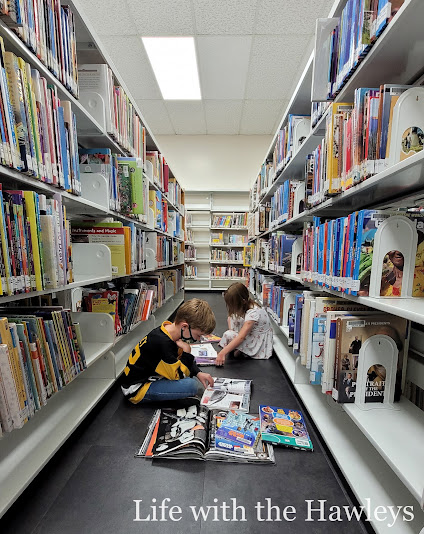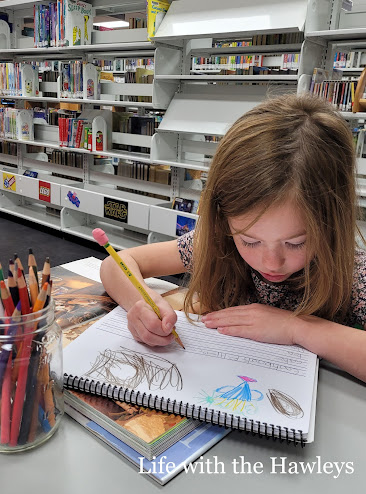It’s no secret that we love books & the library around here, but I wanted to do a Library unit study. My goal was to learn as much as possible about libraries through experiences & conversations. We had a blast discussing & applying information about the library, while integrating various disciplines & deepening a love for learning and books. And guess what?! I wrote it all down for you in case you would like to do this with your family also! This is a 4-week unit study, that we call: Library Project! I am loosely outlining it for you here, & including a booklist with 30+ links at the bottom. I say "loosely" because you could move faster/slower depending on your preferences, and as always, cherry-pick what works for you & your family. I have included a printable version of this post at the bottom.
Week 1:
A- At the beginning of the week, show your kids & have them point out the parts of a book (e.g., title page, book jacket, author vs. illustrator, cover, spine, Caldecott awards vs. Newberry awards, how to put books on a shelf so that you can read the spine).
B- Towards the middle of the week, talk about different kinds of books with your kids (e.g., paperback vs. hardback, fiction vs. nonfiction, what is a reference book? A novel? A fable? An encyclopedia? A picture book?).
C- Later in the week, over tea, provide a scenario for your kids to answer (e.g., What kind of book would I get to learn about frogs? What kind of book is Frog and Toad? Can you find a book on our bookshelf that is nonfiction? If someone wrote a book about my life, what would it be called?).
D- Go to the library and take a tour, and not of just the children’s section. Go and see the entire library. Take moments to stop and pull books off the shelves in areas of the library you do not usually visit (e.g., DIY section, cookbooks, or newspapers). If everyone in your family does not have a library card, make this the special day.
E- And of course, read books about books throughout the week.
Week 2:
A- At the beginning of the week, talk about books again, except this time ask where you would find the books at the library (e.g., Where at our library would I find the reference books about frogs? Memoirs? Biographies? Novels? Cookbooks?).
B- Towards the middle of the week, talk about library etiquette (e.g., we are quiet at the library because others are thinking and we want to be respectful, what does it means to be "overdue"?, how to use shelf markers to put books back in order, how to put books on hold and patiently wait our turn).
C- Talk about how to use a dictionary & a thesaurus (e.g., synonym vs. antonym, alphabetizing by first, second, and third letter, using guide words).
D- Using books that you have at home, discuss the difference between a Table of Contents and an Index, and how we use both to help us search.
E- Talk about Library history, how libraries started in cars and progressed to buildings, the national library, and how libraries differ across the world (e.g., some libraries are on camels, buses, boats.) If you are not aware of this yourself, I have included a lot of books about this in the booklist at the end. Read aloud and learn alongside your child.
F- Go back to the library and review where you would find everything in the library. Then draw a map of the library. Review cardinal directions, and invite your kids to draw a map of the library at the library.
G- And of course, read books about books throughout the week.

A- We can’t just teach our kids to love books, we also have to teach them how to find GOOD books. There are a lot of books available, but not all of them are worthy of our time. We want to practice recognizing books that are beautiful, honorable, & uplifting; we want to be growing from our experiences with books in a positive way. It’s important for me to remind my kids that just because a book is popular to the world does not mean that it is also God-honoring. We are to focus on that which is honest, pure & lovely (Philippians 4:8) & to be clean (Isaiah 52:11) even in our book selections. In our conversations & practice, we broke books into 3 categories:
Lovely & Worthy Books: These books warm your heart & make us feel good. They’re filled with inspiration, truth, & growth. They honor relationships, kindness, & empathy; they encourage us to grow stronger in our faith. Living Books would fall into this category. (Living Books are usually written in a narrative style by a passionate author who captivates the reader, inspires emotional connection, & shares worthy thoughts & inspiring tales. Living picture books typically have beautiful & elaborate illustrations where I catch myself lingering over the pictures long after the page has been read.)
Roller Coaster Books: These books are fun and not awful, but they also don’t grow us in any way. There is no real value in these books, and may be considered twaddle. We have to be careful that we don’t read so many of these books that we are distracted from Lovely & Worthy Books.
Unworthy Books: While these books may seem humorous, they may also contain bad language, or show us how to be disrespectful, rude, or unkind. Evil can often make inappropriate behavior seem harmless or entertaining. We do not want to become desensitized to bad feelings or inappropriate behavior.
Week 4:
A- At the beginning of the week, ask your children, “What is something that you would like to learn about? What is something that you would like to read about at the library?” Take your children to the library and let them try to find books on the topic they selected.
B- Once your children have located a couple books on their topic, give them time to flip through and read. You might want to take a picnic lunch or snack to the library so that they have time to flip through and explore their book selections.
C- Depending on their abilities, ask your children to share what they have learned about on their selected topic. If you have a more advanced child, they could read and then narrate for you what they learned written or orally. If you have a child who is not quite writing on their own, you could pick out some lines from a passage together and use that as copywork. If you have a very young child, they can find their favorite picture and try to replicate it. Remember this is not an intense college research project, but instead a simple application for falling in love with books & how to find them. As an example, for us, when we did this, my son looked for books on “wild boar.” After reading about them he narrated orally and written about the wild boar diet, habitat, and life cycle. My daughter was interested in the cookbook section after our tour. She is really interested in sweets, so she found books on cakes and drew her favorite cakes from the cookbooks. Then she wrote out the different names and we came home and baked the cakes.
C- And of course, read books about books throughout the week.
There is no Frigate like a Book by Emily Dickinson
There is no Frigate like a Book
To take us Lands away
Nor any Coursers like a Page
Of prancing Poetry –
This Traverse may the poorest take
Without oppress of Toll –
How frugal is the Chariot
That bears the Human Soul –
Booklist: This is a collection of amazing books about libraries and the love of books. They are filled with diversity, geography, & history. Put these books on hold at your library before you start, and maybe read 10 a week (2 per day). I have a feeling that some of these you may want to bring home forever:
- The Library by Sarah Stewart
- That Book Woman by Heather Henson
- Miss Dorothy and Her Bookmobile by Gloria Houston
- 'L' is for Library by Sonya Terry
- The Children Who Loved Books by Peter Carnavas
- Our Library by Eve Bunting
- Balderdash: John Newberry and he Boisterous Birth of Children's Books by Michelle Markel
- Planting Stories: The Life of Librarian and Storyteller Pura Belpre by Anika Aldamuy Denise
- My Great Aunt Arizona by Gloria Houston
- Thomas Jefferson Builds a Library by Barb Rosenstock
- Thank You, Mr. Falker by Patricia Polacco
- The Library Bus by Bahram Rahman
- The Oldest Student: How Mary Walker Learned to Read by Rita Lorraine Hubbard
- The Man Who Loved Libraries: The Story of Andrew Carnegie by Andrew Larsen
- The Fantastic Flying Books of Mr. Morris Lessmore by W.E. Joyce
- Library on Wheels: Mary Lemist Titcomb and America's First Bookmobile by Sharlee Glenn
- My Librarian is a Camel: How Books are Brought to Children Around the World by Margriet Ruurs
- A Place to Hang the Moon by Kate Albus
- The Book Dragon by Kell Andrews
- Schomburg: The Man Who Built a Library by Carole Boston Weatherford
- Library Lil by Suzane Williams
- Lottie Paris and the Best Place by Angela Johnson
- Bunny's Book Club by Annie Silvestro
- Madeline Finn and the Library Dog by Lisa Papp
- How to Bake a Book by Ella Burfoot
- Library Lion by Michelle Knudsen
- Library's Most Wanted by Carolyn Leiloglou
- A Book is a Book by Jenny Bornholdt
- Return of the Library Dragon by Carmen Agra Deedy
- Bears Don't Read by Emma Chichester Clark
- The Highest Mountain of Books in the World by Rocio Bonilla
- Jumping Off Library Shelves: A Book of Poems selected by Lee Bennett Hopkins
- At the Library with Dear Dragon by Marla Conn
- Miss Brooks Love Books by Barbara Bottner
- Miss Brooks' Story Nook by Barbara Bottner
- The Detective Dog by Julia Donaldson
- Building Books by Megan Wagner Lloyd
- Nour's Secret Library by Wafa' Tarnowski
- Part of Our Lives: A People's History of the American Public Library by Wayne A. Wiegand
- Library: An Unquiet History by Matthew Battles
- Honey for a Child's Heart by Gladys Hunt
- Read for the Heart: Whole Books for WholeHearted Families by Sarah Clarkson
- Give Your Child the World: Raising Globally Minded Kids One Book at a Time by Jamie Martin
- Sharing Books, Talking Science: Exploring Scientific Concepts with Children's Literature by Valerie Bang-Jensen and Mark Lubkowitz
- Jim Trelease's Read-Aloud Handbook: Eighth Edition by Jim Trelease and Cyndi Giorgis
- The Read-Aloud Family: Making Meaningful and Lasting Connections with Your Kids by Sarah Mackenzie
- Educating the Wholehearted Child by Clay and Sally Clarkson







